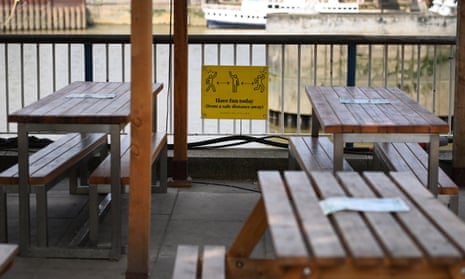Britain’s economic recovery from Covid-19 is coming under pressure amid worker shortages and lengthier pandemic restrictions, as the Delta variant of coronavirus drives up infection rates.
As the government begins to wind down the furlough scheme on Thursday – despite delaying its roadmap out of lockdown by four weeks until 19 July – the Guardian’s monthly snapshot of economic developments suggests the pace of recovery has plateaued.
Figures from the Office for National Statistics show debit and credit card transactions fell by 5% over the week to 17 June, while retail footfall declined for the third week in a row at the tail end of a springtime boom after Covid-19 restrictions were relaxed.
Business leaders are sounding the alarm over a renewed threat to jobs and growth as the Delta variant of coronavirus has driven up infection rates and forced a delay in the final lifting of lockdown restrictions, which ministers had originally pencilled for 21 June.
Meanwhile, firms are coming under mounting pressure from chronic staff shortages and rising supply-chain prices, threatening a burst of inflation pushing up the cost of living in Britain.
Employment remains below pre-pandemic levels, but employers’ groups warn cuts to the furlough scheme from the start of July will endanger jobs and put Britain’s economic recovery at risk.
Frances O’Grady, the general secretary of the TUC, said: “Ministers must not pull the plug on our recovery by cutting off support too soon.
“We need a cast-iron commitment from the chancellor that he will extend furlough for as long as is needed, rather than ending it abruptly in three months’ time. Working families need this certainty now – not a rollercoaster approach to protecting livelihoods.”
For more than a year, the Guardian has tracked the economic fallout from the pandemic on a monthly basis, following infection rates, eight key growth indicators and the level of the FTSE 100. Faced with the deepest global recession since the Great Depression, the Covid crisis watch also monitors Britain’s performance compared with other countries.
On the dashboard in the past month, British retail sales have dipped as UK consumers swapped supermarket and online shopping for trips to pubs and restaurants after the relaxation of pandemic controls earlier this spring. After rising in each of the previous four months, measures of consumer confidence also plateaued in June.
From Thursday, businesses will be forced to contribute 10% of an employee’s wage, rising to 20% in August, as taxpayer furlough support is cut from the current level of 80%. Employees will continue to receive the same amount. About 1.5 million workers are still receiving emergency wage top-ups, according to official figures.
Steve Turner, the assistant general secretary of the trade union Unite, said industries such as hospitality, aviation and the automotive sector were “still on the ropes” and being hit hard by repeated lockdowns, supply chain disruption and inconsistent government decisions.
“If the government tells us we now must ‘live with Covid’, then we need the systems in place to help protect jobs as employers look ahead to continued uncertainty. That means proper furlough support for all workers, including freelancers and others excluded, coupled with sick pay that allows workers to support themselves and their families if they are ill,” he said.
Despite the risks to the economy business activity continued to grow at among the fastest rates since the late 1990s in June, as progress with the Covid vaccine helped lift demand for goods and services. Companies responded to rising workloads by taking on extra staff, helping unemployment fall for the fourth month in a row.
Firms are however running into supply constrains amid acute staff shortages and rising raw material prices and transport costs. Hospitality venues, logistics and warehousing are under particular pressure, with warnings chilled food will struggle to reach some shops this summer because of a lack of drivers and production workers.
Inflation jumped to 2.1% in May, stoking concerns that the Bank of England and other major central banks around the world will raise interest rates or wind down their quantitative easing bond buying programmes to prevent the economy from overheating.
However, many economists argue the current burst in inflation is likely to prove temporary and warn there are bigger risks to a sustainable economic recovery from removing support too soon. Business leaders also warn the outlook for jobs is worsening as the Delta variant pushes up infection rates and leads to lengthier pandemic restrictions in the UK and several other countries.
Jagjit Chadha, the director of the National Institute of Economic and Social Research, said risks remained from winding down furlough, higher company debt levels incurred during the pandemic, and continuing restrictions.
Writing in the Guardian, he said the Treasury and the Bank needed to adopt a flexible approach to maintaining emergency support while risks to the recovery remained.
“[It’s] far too early to get out the bunting,” he said.
“As an economy sensitive to the fluctuations in world trade, the UK is acutely subject to the maxim that this won’t end for anyone until it ends for everyone. This means that for as long as the crisis casts its shadow, the denuded prospects for tourism, international trade and labour mobility may act as a drag on UK activity.”
